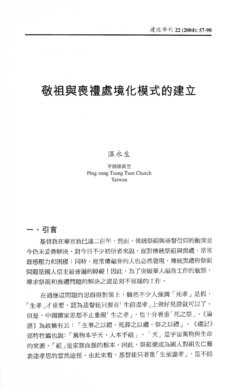敬祖與喪禮處境化模式的建立/溫永生
撮要
經常傳福音的人,必然發現華人信主最普遍的障礙就是傳統祭祖問題;台灣的基督徒信主後,最感困擾的,也莫過於是民間喪禮的應對。
然而,從過去的宣教史來看,華人教會多是以違反禁拜偶像的誡命作為反對祭祖的理由;從基督教敬祖實務的角度來看,目前仍有不少人因擔心犯了拜偶像的罪,而遲疑不敢「越雷池一步」,或甚至在喪禮和敬祖上採極端保守的立場,而造成長久以來向國人宣教的困境。
因此,本論文從聖經出發,針對十誡中第一、二誡作解經研究,探討拜偶像的真義;進而,研究第五誡,比較聖經和傳統的孝道觀的異同,並建立慎終追遠與相關宣教神學的聖經基礎,為基督教敬祖實務奠立聖經的根基。
其次,過去的宣教史已累積了許多經驗,並建立了豐富的學理。因此,本論文從宣教學的福音與文化的關係、傳播理論、處境化及崇拜學,來構築敬祖「取代模式」的觀念與理論。接著,採兩個重要工具 – 維根斯坦的「語言行為定義法」和田立克的「符號與象徵分類法」,設計定期性的做法,即「追思三禮」和 「致敬禮」,和長期性的做法,即「祖先紀念表」或「世代傳承表」,透過這些具體的做法與表達,冀能改變國人對基督教不敬祖宗的刻板印象,而帶出福音工作的突破。
ABSTRACT
Those who regularly proclaim the Gospel among Chinese quickly discover that the most common hindrance in bringing Chinese to Christian faith is traditional ancestor worship. The most distressing thing for Taiwanese Christians after conversion is to face traditional folk funeral rituals.
From the perspective of mission history, Chinese churches generally opposed ancestor worship based solely on the prohibition against idolatry. On the other hand, from the perspective of practical Christian ancestor reverence, many Christians do not dare to move even one step towards a new solution out of fear of violating the commandment against idolatry. Or even worse, facing funerary rituals and ancestral veneration, they take an extremely conservative position, and thus contributing to the longstanding difficulty in proclaiming the Gospel among Chinese.
Therefore, this thesis seeks to build a conceptual and theoretical “substitution model” of Christian ancestor reverence based on theories of missiology dealing with the relationship of the Gospel and culture, communication theory, contextualization, and liturgical study. Next, two important tools, namely Ludwig Wittgenstein’s “definition of language and behavior” and Paul Tillich’s “classification of sign and symbol,” will be adopted on the research. This thesis seeks to design episodal methodology, such as “the three memorial ceremonials” and “reverence ceremonial.” Through these fundamental methods and expressions, we hope to change the negative impression Chinese bear towards Christians’ neglect of ancestor reverence, so as to promote a breakthrough in evangelistic work.
原載於《建道學刊》22期(2004年1月),頁57-98。







